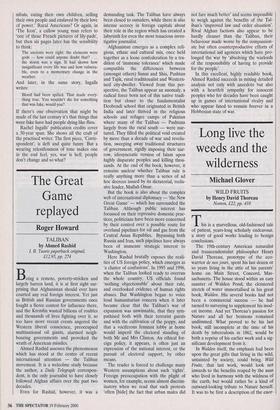The Great Game replayed
Roger Howard
TALIBAN by Ahmed Rashid I. B. Tauris paperback original, £12.95, pp. 274 Being a remote, poverty-stricken and largely barren land, it is at first sight sur- prising that Afghanistan should ever have courted any real foreign interest. Yet just as British and Russian governments once fought a fierce contest for influence there, and the Kremlin wasted billions of roubles and thousands of lives fighting over it, so too have more recent events angered the Western liberal conscience, preoccupied multinational oil giants, alarmed neigh- bouring governments and provoked the wrath of American missiles.
Ahmed Rashid assesses the phenomenon which has stood at the centre of recent international attention — the Taliban movement. It is a welcolme study because the author, a Daily Telegraph correspon- dent, is the only journalist to have closely followed Afghan affairs over the past two decades.
Even for Rashid, however, it was a demanding task. The Taliban have always been closed to outsiders, while there is also intense secrecy in foreign capitals about their role in the region which has created a labyrinth for even the most tenacious inves- tigative journalist.
Afghanistan emerges as a complex reli- gious, ethnic and cultural mix, once held together as a loose confederation by a tra- dition of 'immense tolerance' which made compatible the differences between (amongst others) Sunni and Shia, Pushtun and Tajik, rural traditionalist and Western- ised city-dweller. Viewed from this per- spective, the Taliban appear an anomaly, a radical force born not of this native tradi- tion but closer to the fundamentalist Deobondi school that originated in British India and later thrived in the religious schools and refugee camps of Pakistan where many of the Taliban — Pashtuns largely from the rural south — were nur- tured. They filled the political void created by more than a decade of war and revolu- tion, sweeping away traditional structures of government, rigidly imposing their nar- row, idiosyncratic version of Islam upon highly disparate peoples and killing thou- sands. At the end of the book, however, it remains unclear whether Taliban rule is really anything more than a series of ad hoc decrees issued by its dictatorial, reclu- sive leader, Mullah Omar.
But the book is also about the complex web of international diplomacy — 'the New Great Game' — which has surrounded the Taliban. Although public interest has focussed on their repressive domestic prac- tices, politicians have been more concerned by their control over a possible route for overland pipelines for oil and gas from the Central Asian Republics. Bypassing both Russia and Iran, such pipelines have always been of immense strategic interest to Washington.
Here Rashid brutally exposes the reali- ties of US foreign policy, which emerges as `a cluster of confusions'. In 1995 and 1996, when the Taliban looked ready to overrun the whole country, US officials found `nothing objectionable' about their rule, and overlooked evidence of human rights abuses. But Washington began to voice loud humanitarian concern when it later became clear that the Taliban's war of expansion was unwinnable, that they sym- pathised both with their terrorist guests and with the cultivation of the poppy, and that a vociferous feminist lobby at home would imperil the electoral standing of both Mr and Mrs Clinton. An ethical for- eign policy, it appears, is often just an expression of the national interest, or the pursuit of electoral support, by other means.
The reader is forced to challenge many Western assumptions about such 'rights'. Foreign preoccupation with the plight of women, for example, seems almost discrim- inatory when we read that such protests `often [hide] the fact that urban males did not fare much better' and seems impossible to weigh against the benefits of the Tal- iban's 'improved law and order situation'. Rival Afghan factions also appear to be hardly cleaner than the Taliban, their behaviour made worse by the compassion- ate but often counterproductive efforts of international aid agencies which have pro- longed the war by 'absolving the warlords of the responsibility of having to provide for the people'.
In this excellent, highly readable book, Ahmed Rashid succeeds in mixing detailed analysis not only with anecdote but also with a heartfelt sympathy for innocent peoples who for decades have been caught up in games of international rivalry and who appear fated to remain forever in a Hobbesian state of war.


































































 Previous page
Previous page